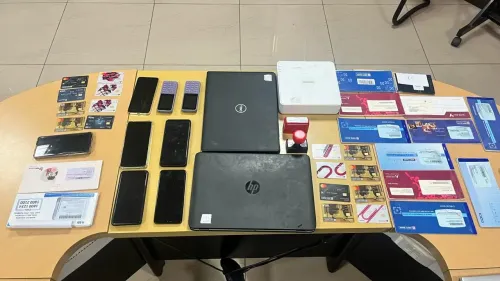How Will the 6-Point Policy Roadmap Propel TN's Global Mobility Leadership?

Synopsis
Key Takeaways
- Six-Point Policy Roadmap aims to elevate Tamil Nadu’s role in sustainable mobility.
- Tamil Nadu Mobility Innovation Fund proposed for R&D support.
- Creation of mobility R&D zones near major hubs.
- Focus on academic-industry partnerships to foster innovation.
- Mobility Skills 2030 to address talent gaps in the EV sector.
Chennai, June 10 (NationPress) The State Planning Commission (SPC) has introduced an extensive six-point policy framework designed to position Tamil Nadu as a global frontrunner in sustainable mobility and electric vehicle (EV) innovation.
Entitled “Tamil Nadu’s Automotive Future,” this report was officially delivered to Chief Minister M.K. Stalin by Deputy Chief Minister Udhayanidhi Stalin along with SPC Executive Chairman J. Jeyaranjan at the State Secretariat.
The report emphasizes the necessity for Tamil Nadu to transition from a conventional automotive manufacturing hub to a nucleus for profound mobility innovation. To realize this shift, the Commission proposed institutional and financial backing for advanced research, intellectual property (IP) generation, and product development.
A pivotal suggestion includes the creation of a Tamil Nadu Mobility Innovation Fund to co-finance high-risk, high-reward R&D in fields such as battery technologies, EV operating systems, hydrogen propulsion, energy management software, and lightweight materials.
The roadmap also advocates establishing mobility R&D zones adjacent to existing EV hubs in Chennai, Coimbatore, and Hosur. These zones would feature shared facilities like battery certification centres, electromagnetic compatibility (EMC) labs, simulation environments, and vehicle testing tracks.
The SPC urged the establishment of robust academic-industry partnerships with esteemed institutions such as IIT-Madras and Anna University. It further recommended fellowships and startup grants for researchers focused on commercially viable innovations.
To foster wider participation, the Commission suggested plug-and-play access to public R&D labs and prototyping tools for startups and MSMEs.
Highlighting the issue of underutilized talent, the report pointed out that over 150,000 engineering graduates are produced each year in Tamil Nadu yet remain underrepresented in core R&D roles. To address this, the Commission proposed launching the Mobility Skills 2030 initiative featuring specialized courses in EV powertrains, battery technology, embedded systems, and logistics analytics.
For equitable regional development, the report recommended targeted incentives for firms setting up operations in non-urban districts, positioning mobility as a catalyst for balanced economic growth. On the infrastructure side, the SPC called for expedited deployment of public charging stations along highways, in industrial zones, and within urban mobility hubs.
It also urged time-bound incentives for commercial EVs, including electric trucks and small commercial vehicles (e-SCVs).
The Commission cautioned that EV adoption in the heavy commercial vehicle sector might remain below 20% by 2030 without active government intervention. It proposed establishing a Mobility Innovation and Growth Council comprising government, industry, academia, and civil society stakeholders to guide policy implementation.
Ultimately, the roadmap called for the development of a statewide EV charging infrastructure master plan and urged the government to mandate EV-ready building codes in urban planning to ensure long-term sustainability.










